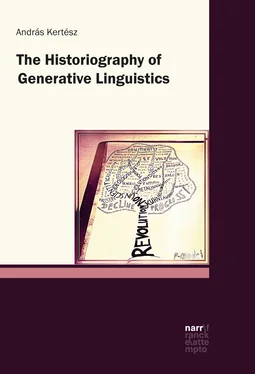Concerning (T22)(b), the authors find it »mystical« that the group of generativists that had previously been enthusiastic about the Theory of Government and BindingGovernment and Binding, Theory of and applied it successfully, gave it up overnight and stood up for a less maturemature program that lacked a firm methodological and empirical foundation and had not resulted in new scientificscientific insights. They find it difficult to understand that »large numbers of researchers should substitute one theorytheory for another simply on the basis of ChomskyChomsky, Noam’s personal authorityauthority , without subjecting his assumptions to the sort of critical evaluation that they would normally apply to theoretical innovations proposed under different authorship« (LappinLappin, Shalom et al. 2000a: 669; emphasis added).
Thus, in the authors’ view, rational argumentation is of a minor significance in generative linguistics (LappinLappin, Shalom et al., 2000a: 670), and the solution of the ›mystery‹ is, as the last quotation shows, authorityauthority and group membership.1
As their final conclusion, the authors question whether the Minimalist ProgramMinimalist Program is scientificscientific at all (cf. LappinLappin, Shalom et al. 2000a: 670, 2000b: 878, 2001: 916), saying: »We know of no serious scientific discipline where theoretical paradigmsparadigm are granted large scale acceptance in such a cavalier and uncritical manner« (Lappin et al., 2000a, p. 670).2 This conclusion is even sharper than SeurenSeuren, Pieter A.M.’s: while Seuren characterizes minimalismminimalism as spurious sciencesciencespurious, Lappin et al. suggest that it is not even a science, but, as the title of their target article suggests, the result of an »unscientific revolutionrevolutionunscientific«.
The authors do not define their historiographicalhistoriography framework, but it obviously follows from the paraphrase of the title of KuhnKuhn, Thomas S.’s book and the use of KuhnianKuhnian terminology (›paradigmparadigm‹, ›paradigm shift‹) that they consider the Kuhnian approach to the historyhistory of science as their historiographical point of departure.
LappinLappin, Shalom, LevineLevine, Robert D. and JohnsonJohnson, David D.’s article was followed by a debate in the same journal, in which the arguments for and against minimalismminimalism, and parallel to this, the opinions on the revolutionaryrevolutionary nature of minimalism versus that of the Theory of Government and BindingGovernment and Binding, Theory of polarized.3
LappinLappin, Shalom et al.’s solution for (P) can be reconstructed as follows:
| (SP22) |
The basic term of the historiographyhistoriography of generative linguistics with respect to the Minimalist ProgramMinimalist Program is ›authority‹authority and ›unscientific‹, its central hypothesis is (T22) and its historiographical framework is KuhnKuhn, Thomas S. (1970) [1962]. |
2.6 Digression: ChomskyChomsky, Noam’s self-assessment
ChomskyChomsky, Noam evaluated his own work in many interviews.1 His answers to the questions raised cannot be treated as a historiographicalhistoriography achievement; however, it may be instructive to reflect on them, as they contribute to our understanding of the historiographical standpoints surveyed in the present book.
Although, according to MurrayMurray, Stephen O. (1994: 244, footnote 20; 246, footnote 22; 1989: 154) and KoernerKoerner, E.F. Konrad (2004: 51), ChomskyChomsky, Noam did not use the word ›revolution‹ to characterize his own theories, from some of his statements we may infer that he considers the Theory of Government and BindingGovernment and Binding, Theory of (Chomsky 1981) – or as it was later called, the Theory of Principles and ParametersPrinciples and Parameters, Theory of (Chomsky & LasnikLasnik, Howard 1993) – revolutionaryrevolutionary.
On the one hand, it is interesting to compare the arguments for the KuhnianKuhnian revolutionrevolutionKuhnianaryrevolutionary nature of Syntactic Structures Syntactic Structures (see Section 2.1.1) with the way in which ChomskyChomsky, Noam, in the interview he gave to Riny Huybregts and Henk van RiemsdijkRiemsdijk, Henk in 1979, rejects the statement that the first 25 years of generative linguistics can be considered a Kuhnian revolution, because KuhnKuhn, Thomas S.’s work »is wildly misused outside the natural sciencesciencenaturals« (Chomsky 2004: 66). He continues as follows:
So I think that KuhnKuhn, Thomas S.’s notions do not really apply outside the fields in which really significant intellectual progressprogress takes place. […] I just do not think that linguistics has undergone any kind of intellectual revolutionrevolutionintellectual (ChomskyChomsky, Noam 2004: 66).
He interprets early generative linguistics as a refinement – and not as a radical replacement – of the method of neo-Bloomfieldianneo-BloomfieldianBloomfieldian structuralismstructuralism:
[…] it was very striking to me when transformationaltransformation grammargrammar first gained a certain small degree of popularity in the early 60s, to notice that primarily it was just used as another descriptive device. There are things that you can describe in that way more easily than in terms of constituent structure, but that is not a fundamental conceptual change […] ChomskyChomsky, Noam (2004: 66; emphasis added).
He adds that »all of this work of the past twenty-five years [relative to 1979] is preliminary to a future conceptual revolution which I think we can begin to speculate about the vague outlines of« (ChomskyChomsky, Noam 2004: 67; emphasis added). In rejecting the revolutionaryrevolutionary nature of his early work, Chomsky contradicts those of his followers who continue to assert the revolutionary nature of Syntactic Structures Syntactic Structures , while, in this respect, he seems to share the standpoint of those publications that at the outset rejected the idea that Syntactic Structures was revolutionary (HymesHymes, Dell & FoughtFought, John 1982, MurrayMurray, Stephen O. 1994, KoernerKoerner, E.F. Konrad 1989, 2002, 2004, HarrisHarris, Randy Allen 1993, etc.). The above quotations are noteworthy in yet another respect. Interestingly enough, while the quotation maintains that in Chomsky’s view his early work was not revolutionary, this claim refers to the very phase of his professional career in which – according to Murray, LakoffLakoff, Robin, Harris and others – Chomsky applied revolutionary rhetoricrhetoric as his most important weapon in the generativist war against the neo-Bloomfieldianneo-Bloomfieldians.
On the other hand, in an interview by GrewendorfGrewendorf, Günther he mentioned the Theory of Principles and ParametersPrinciples and Parameters, Theory of without, however, referring to KuhnKuhn, Thomas S., when he was asked which phase of generative linguistics he found revolutionaryrevolutionary (Grewendorf 1994: 293). ChomskyChomsky, Noam (2002a: 95) describes the significance of the Theory of Government and BindingGovernment and Binding, Theory of – which was explained systematically in lectures he gave in Pisa and later published as Chomsky (1981) – using expressions which might remind one of the usual characterization of the Copernican Revolution:2
The whole historyhistory of the subject, for thousands of years, had been a history of rules and constructions, and transformationaltransformation grammargrammar in the early days, generative grammar, just took it over. So the early generative grammar had a very traditional flair. […] What happened in the Pisa discussion was that the whole framework was turned upside down . […] the way of looking at things was totally different from anything that had come before, and it opened the way to an enormous explosion of research in all sorts of areas, typologically very varied. […] In fact I think it is fair to say that more has been learned about languagelanguage in the last twenty years than in the preceding 2000 years (ChomskyChomsky, Noam 2002a: 95; emphasis added).3
Читать дальше












